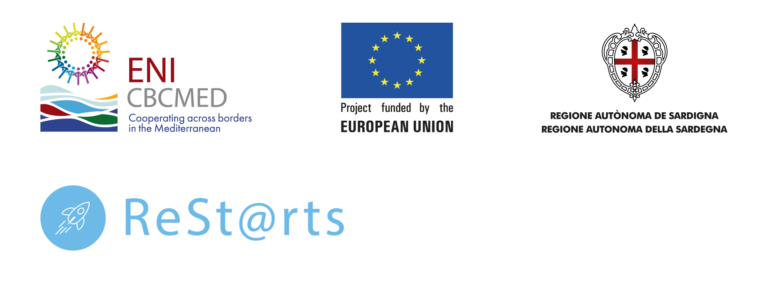ReSt@rts Project, funded by ENI CBC MED Programme, addresses young people with the aim to increase financing and employment opportunities and improve the living conditions of the vulnerable population. Another objective of the initiative is to create continuity for the previous project MEDSt@rts that paved the way for building a joint Mediterranean microfinance strategy more responsive to the needs of young innovative entrepreneurs, Microfinance sector players and investment structures, to operate within a safer and more organized legislative and institutional environment.
In this article, we share with you the activities and results of the 3rd Microfinance Forum titled “Challenges of Building a Joint Mediterranean Microfinance Strategy Based on Microfinance Tools and Support Services for Start-ups” hosted by the Chamber of Commerce, Industry and Agriculture in Sidon and South Lebanon on March 30th. 2022. The Forum is part of a series of activities within the Medst@rts project funded by the ENI CBC MED programme, in collaboration with representatives of microfinance institutions in Lebanon and international partners from “Italy, Greece, Tunisia and Palestine”.
The hybrid event – also broadcasted on Zoom – was attended by representatives of microfinance institutions in Lebanon and international partners from Italy, Greece, Tunisia and Palestine; the president of the Chamber of Commerce, Industry and Agriculture in Sidon and South Lebanon, Mr. Mohamad Saleh; the General Director of Fondazione di Sardegna, Mr Carlo Mannoni; the General Director of Sfax Chamber of Commerce – Tunisia, Ms. Ikram Makni; Al Majmoua Executive Director, Dr Youssef Fawaz; the Program Manager at the Lebanese Microfinance Association in Lebanon, Ms Ola Hariri; former General Manager of the Ministry of Economy & Trade (Lebanon), Ms. Alia Abbas; the Microcredit Program Administrative Manager at Makhzoumi Foundation, Mr.Vartkes Keutelian; the Internal Control Officer at The Economic and Social Fund for Development (ESFD), Mr. Helmi Hage; the consultant at the Association D’entraide Professionnelle, Mr. Bassam Shami, as well as socio-economic stakeholders, entrepreneurs and members of the administrative board of Sidon Chamber.
The Forum was launched with speeches from the President of Sidon Chamber, Mr Mohamad Saleh, Ms Ikram Makni, General Director of Sfax Chamber of Commerce and Mr Carlo Mannoni, the General Director of Fondazione di Sardegna (lead beneficiary). Speeches highlighted the project’s potential impact, both in terms of establishing a network of cross-border cooperation in co-financing and its importance in enhancing entrepreneurs’ skills and capabilities for managing their businesses and creating job opportunities.
Interventions of representatives of microfinance institutions in Lebanon discussed the social, humanitarian and developmental role of this sector as well as the main challenges it is currently facing due to the collapse of the national currency’s value against the multiple dollar exchange rates, the banking crisis, and the restrictions on withdrawals from deposits and savings, whether for clients or microfinance institutions. This impacted the financial portfolios of microfinance institutions and the ability of clients to settle payments due to higher inflation rates, increase in prices, decline in purchasing power, and cessation of financial investment flows. This led to the collapse of all sectors as well as SMEs, as most of them were unable to settle their payments or were forced to close. Meanwhile, some were able to settle their loans based on an exchange rate of 1,500 LBP to the dollar, which caused various losses to the microfinance institutions’ portfolios. The Beirut Port explosion and the COVID-19 pandemic caused additional burdens. However, despite the hardships and through their corporate social responsibility, these institutions provided various types of services in different fields as well as training courses to enhance the skills and resilience of project owners and scheduled their debts. Microfinance institutions worked with the “Kafalat” company to implement the “B5” project to rebuild and support the institutions affected by the Beirut Port explosion.
The conferees developed a series of preliminary ideas that will be discussed with the local and international partners of the Medst@rts project later on. They were summarised as follows:
• provide access to funding mechanisms supported by worldwide networks that can connect entrepreneurs and investors from everywhere;
• foster cooperation between the public and private sectors for the development/ reshaping of the Microfinance sector to meet the emerging needs of the borrowers and for using new financing tools;
• increase awareness and knowledge on microfinance insurance for entrepreneurship to reduce unnecessary and risky refinancing;
• capitalize on the results of other ENI CBC Med Programme initiatives to meet the need of entrepreneurs and put in place a microfinance program including technical support for establishing and managing their businesses;
• Develop micro-guarantee schemes that support more lending to MSMEs by reducing risks on MFIs and collateral requirements from prospective borrowers;
• Motivate MFI networks and actors that are vital members to help finance the ecosystem.
• Provide technical assistance for reshaping the regulatory frame of MFIs according to the requirements to accommodate the new financing tools (allow taking savings..).



